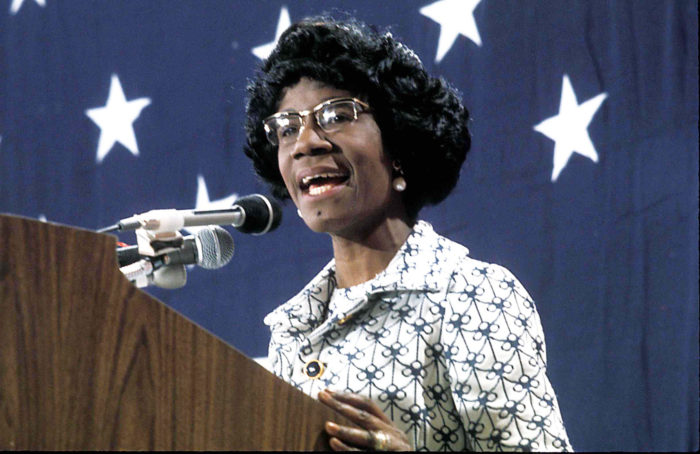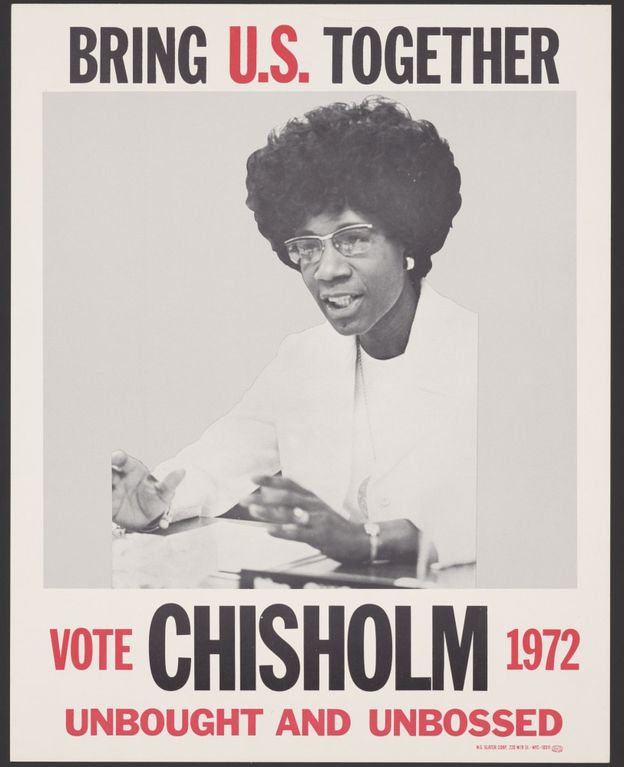By Deborah George
There are many historical figures that are praised or talked negatively about. People like Churchill or Hitler are remembered for how they affected history. On the contrary, there are also some historical figures that are unfairly forgotten. Before Obama became the first African American president and before Hillary Clinton tried to run for president, there was one amazing, confident woman. Her name was Shirley Chisholm.
Chisholm was born Shirley Anita St. Hill on November 30, 1924 in Brooklyn, New York. She was the oldest daughter, of four, to immigrant parents. For some time of her childhood, Chisholm stayed in Barbados on her grandparents’ farm while her parents where trying to get settled in the United States. A few years later, she migrated to the United States and started going to public schools in Brooklyn. She graduated from Brooklyn Girls’ High in 1942 with very high marks.
Chisholm would then attend Brooklyn College on a scholarship, and graduated in 1946 cum laude, and with a B.A. in sociology. She originally worked as a nursery school teacher, and married her first husband, Conrad Q. Chisholm in 1949. Even though Chisholm was considered a double minority at the time, she joined the League of Women Voters, the Urban League, the National Association for the Advancement of Colored People (NAACP), and the Democratic Party Club in Bedford-Stuyvesant, Brooklyn.
In 1964, Shirley Chisholm ran for the New York State Legislature. She was elected, making her only the second African American woman to do this. The new influential Democratic political machine allowed Chisholm to reach for a new opportunity, but she had to face several challengers in the primary round. She faced three African Americans in this election: Thomas R. Jones, Dolly Robinson, and William C. Thompson. In 1968, she beat Thompson, her closest competitor, by about 800 votes and won herself a seat in Congress.
As America’s first black congresswoman, she spoke up for racial and gender equality, and introduced more than 50 pieces of legislation. In 1971, she became the co-founder of the National Women’s Political Caucus, and in 1977, she became the first black woman to serve on the House Rules Committee. However, her biggest chance was yet to come.
In 1972, Chisholm declared herself a serious candidate to become America’s Democratic nominee for President. Despite all she had accomplished so far, discrimination followed her, especially during her run for President.
First, she was prevented from being able to participate in the primary debates that were televised. After taking some legal action, she was only allowed to make one speech. Even through these obstacles, many people continued to support her. She was able to enter 12 primaries, and acquired 152 of the delegates’ votes. Controversy continued to follow her campaign.
She suffered gender discrimination from African-American politicians, when she ran for president, and then noticed to her surprise, that racial discrimination also marred her relations with other women of Congress. White feminists and the National Organization of Women failed to fully support Chisholm in her historic bid to become the presidency.
In 1976, she faced a rival named Samuel D. Wright. Ultimately, she won the general election with 83% of the vote. Chisholm left Congress in the year 1983. After leaving Congress, she cofounded the National Political Congress of Black Women. She also helped campaign for the presidential bids of Jesse Jackson in 1984 and 1988. In addition, she taught at Mount Holyoke College. Chisholm was nominated to become an U.S. Ambassador to Jamaica, but declined due to ill health.
Shirley Chisholm passed away on January 1,2005 at the age of 81.
Chisholm once said, “Of my two “handicaps” being female put more obstacles in my path than being black.” Yet all the obstacles that she faced didn’t stop her. Her boldness and confidence has changed the game for every woman, especially girls who want to make it in the political world. Overall, she is a huge icon and a trailblazer that deserves more historical respect and attention.
***
“I want history to remember me… not as the first black woman to have made a bid for the presidency of the United States, but as a black woman who lived in the 20th century and who dared to be herself. I want to be remembered as a catalyst for change in America.”—Shirley Chisholm

